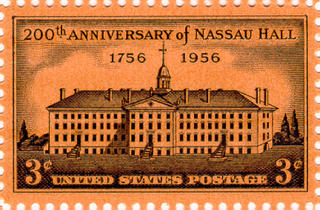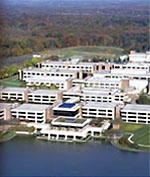TTAB Finds "PRINCETON PHARMACEUTICAL PRODUCTS" Geographically Descriptive
Bristol-Myers Squibb ran into a New Jersey barrier in its attempt to overcome the PTO's refusal to register the mark PRINCETON PHARMACEUTICAL PRODUCTS for a "house mark for a line of pharmaceutical preparations." The Board affirmed the Section 2(e)(2) refusal, finding the mark to be primarily geographically descriptive. In re Bristol-Myers Squibb Co., Serial No. 78222332 (July 15, 2005) [not citable].

Examining Attorney Heather D. Thompson submitted an American Heritage Dictionary entry identifying Princeton as a "borough of central New Jersey north-northeast of Trenton," and as "the seat of Princeton University." Bristol-Myers did not deny that Princeton is a generally known geographic place. Instead, it contended that the primary significance of Princeton is its association with Princeton University, as well as with other "esteemed educational institutions." The Board, however, agreed with the PTO that Princeton is "first and foremost" a geographic location. "To the extent that 'Princeton' does evoke an association with educational centers and institutions, that meaning is geographic as well." The addition of the generic and/or merely descriptive term PHARMACEUTICAL PRODUCTS does not overcome the primarily geographic significance of the mark as a whole.

As to the second prong of the test, the Examining Attorney argued that purchasers are likely to believe that the goods will originate (it was an I-T-U application) in Princeton because (1) Bristol-Myers researches and develops drugs in Princeton, and (2) Princeton is known for pharmaceutical products and companies. The Examining Attorney had asked Applicant whether the goods would be produced in, or have some other connection with, Princeton, but Applicant's response was "evasive." Although the Examining Attorney did not pursue that question, the Board nonetheless found that the uncontroverted evidence "shows that the goods do or will in fact come from Princeton."
"Even if applicant's 'PRINCETON' line of pharmaceuticals is or will not be actually manufactured in Princeton.... Clearly, the record shows that a public association is likely between applicant's goods and Princeton, New Jersey, in view of the fact that, at a minimum, applicant has a pharmaceutical research facility and moreover its pharmaceutical research headquarters there."
In addition, Applicant's own evidence showed that Princeton is the home of numerous national and international corporate research centers and headquarters.
The Board therefore found that the PTO had satisfied the second prong of the test: that the public is likely to believe that Applicant's products emanate from Princeton, New Jersey.

Bristol-Myers pointed to its incontestable Registration for the same mark for "analgesics and anti-inflammatory pharmaceutical preparations," but the Board noted that the current identification of goods is broader and that "[o]wnership of an incontestable registration does not give applicant a right to register the same mark for different goods."
Applicant also pointed to a now-cancelled registration for the same mark for the same goods as in the current application, but again Bristol-Myers struck out:
"A cancelled registration is not entitled to any of the statutory presumptions of Section 7(b) of the Trademark Act. See, e.g. In re Hunter Publishing Co., 204 USPQ 957, 963 (TTAB 1979) (cancellation 'destroys the Section [7(b)] presumptions and makes the question of registrability "a whole new ball game" which must be predicated on current thought).'"
The Board's "current thought" is that the house mark PRINCETON PHARMACEUTICAL PRODUCTS is primarily geographically descriptive, and therefore the Board affirmed the refusal to register.
Text Copyright John L. Welch 2005. All Rights Reserved.




0 Comments:
Post a Comment
<< Home